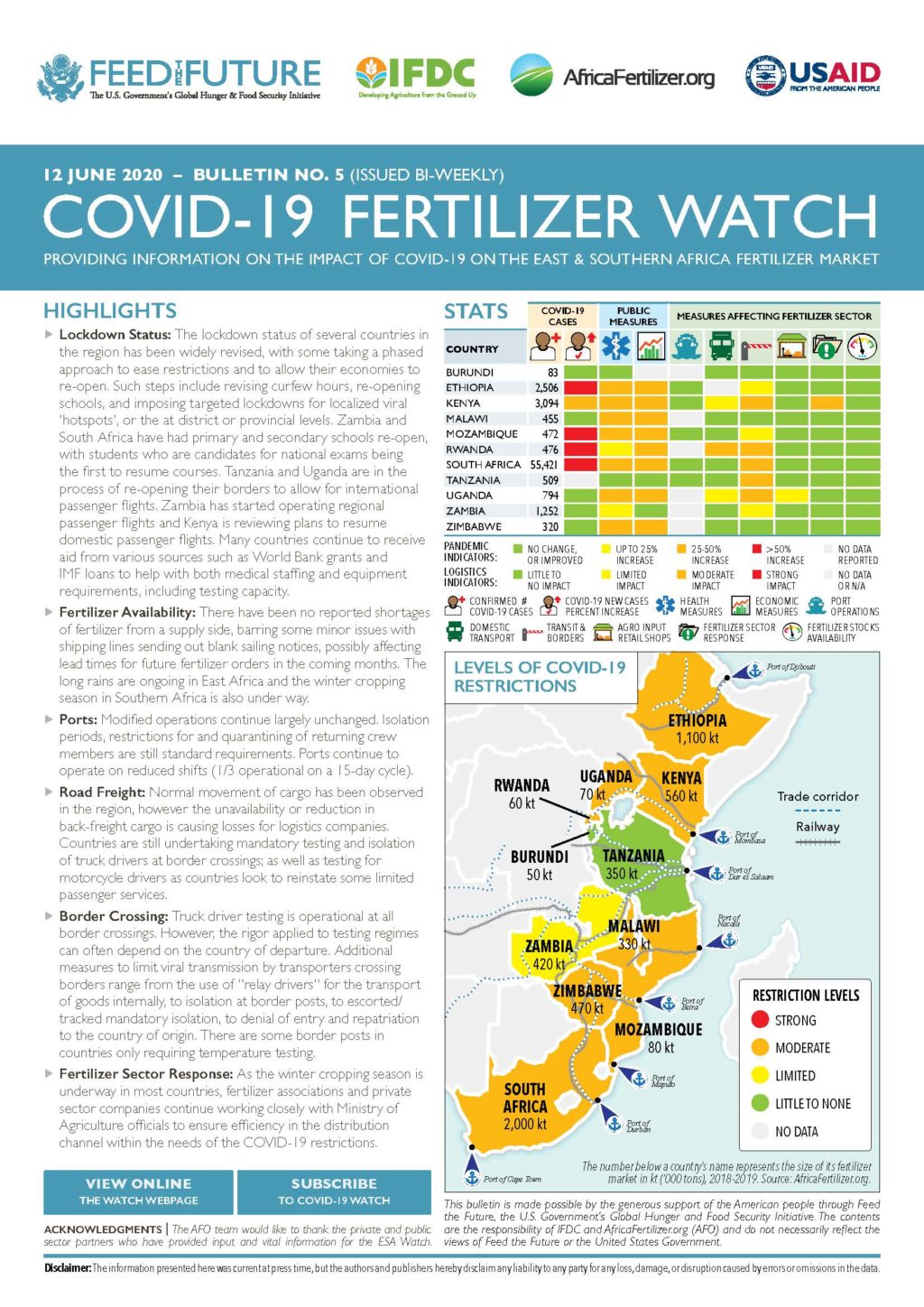
Subscribe for updates
Jump to Previous Issues
Due to the rapid spread of the novel coronavirus (COVID-19), governments all over the globe have placed restrictions on various forms of travel and trade. In many nations in Africa, where rates of food insecurity and malnutrition remain high, a prolonged restriction on the import and distribution of agricultural inputs could have profound negative impact on food production, which could cause a hunger crisis in addition to a sanitary one.
What is the East and Southern Africa Fertilizer Watch?
IFDC and AfricaFertilizer.org are working to ensure that fertilizers and other agricultural inputs are able to move freely throughout the region – despite necessary government measures to stop the spread of COVID-19 – so that they can continue to reach farmers in time for the growing season. This initiative is led by the two organizations with support from the USAID-funded Bureau of Resilience and Food Security (RFS) Feed the Future project on Soil Fertility Technology Adoption, Policy Reform, and Knowledge Management (RFS-SFT) implemented by IFDC.
The East and Southern Africa Fertilizer Watch is designed to provide bi-weekly (twice per month) updates to stakeholders throughout 11 countries in the region using data collected around 10 indicators. These indicators are related to a variety of information such as the spread of COVID-19, measures taken by country governments, and logistical constraints that affect fertilizer flows. The goal is a well-informed and prepared fertilizer supply chain, where actors can use the information to plan accordingly and ensure consistent delivery to farmers.
Current Highlights
Published Thursday, June 25, 2020. These highlights will be updated every Thursday.
- Lockdown Status: The lockdown status of countries in the region remains unchanged, with several countries extending restrictions such as states of emergency, curfews, lockdowns in hotspots, and allowing businesses to resume operations under strict COVID preventive guidelines. Some countries, however, are now considering re-opening schools, with Uganda, South Africa, Zambia and Zimbabwe taking a phased approached with the reopening of primary schools, secondary schools and universities. Several countries have opened their borders for repatriation of citizens and evacuation of foreign nationals. Tanzania is the only country that has fully re-opened its borders for passenger flights. Many countries continue to receive aid from various sources such as World Bank grants and IMF loans to help with both medical staff and equipment, including testing capacity.
- Fertilizer Availability: There have been no reported shortages of fertilizer from the supply side, barring some minor issues with shipping lines sending out blank sailing notices, possibly affecting lead times for future fertilizer orders in the coming months. The long rains continue in East Africa, with the winter cropping season ongoing in Southern Africa.
- Ports: Port operations largely remain unchanged as they still require isolation periods and restrictions on crew changes and quarantining for returning crew members. Ports continue to operate on reduced shifts (1/3 operational on a 15-day cycle) with modified operations.
- Road Freight: Normal movement of cargo has been observed in the region, however the unavailability or reduction in back-freight cargo continues to cause losses for logistics companies. Several countries are undertaking truck driver screening and testing within borders and at border crossings.
- Border Crossing: Truck driver testing is operational at all border crossings. However, several countries are in negotiations to set up guidelines that will ease border congestion. Guidelines may include permitting truckers to continue their onward journeys as tests are processed and notifications to seek immediate medical attention sent to those with positive results. Current testing rigor is dependent on the country of departure, and ranges from the use of “relay drivers” to transport goods internally, isolation at border posts, escorted mandatory isolation, denial of entry and repatriation, or only temperature testing.
- Fertilizer Sector Response: As the cropping season is already ongoing in most countries, fertilizer associations and private sector companies continue working closely with Ministry of Agriculture officials to ensure efficiency in the distribution channel within the needs of the COVID-19 restrictions.
Update #1 – April 23, 2020
Update #2 – April 30, 2020
Update #3 – May 14, 2020
Update #4 – May 28, 2020
Update #5 – June 12, 2020
Update #6 – June 26, 2020
This bulletin is made possible by the generous support of the American people through Feed the Future, the U.S. Government’s Global Hunger and Food Security Initiative. The contents are the responsibility of IFDC and AfricaFertilizer.org (AFO) and do not necessarily reflect the views of Feed the Future or the United States Government.




